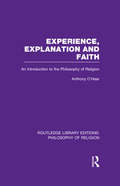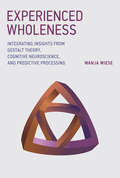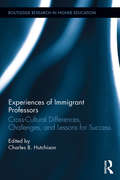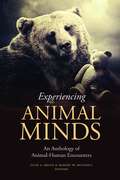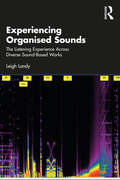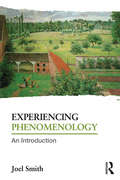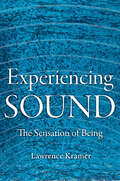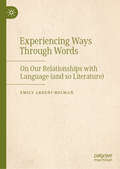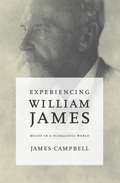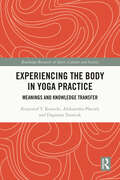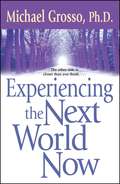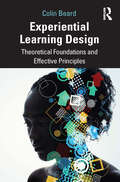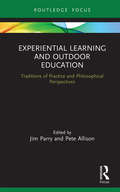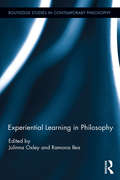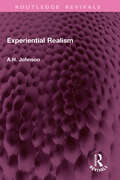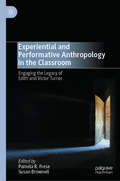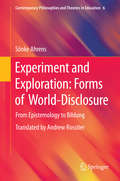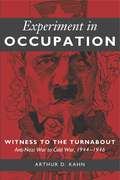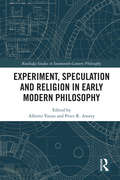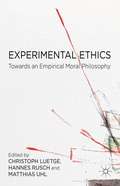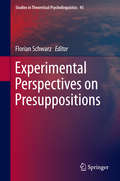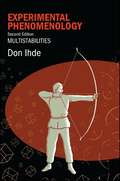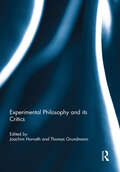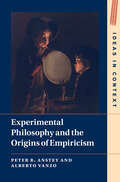- Table View
- List View
Experience, Explanation and Faith: An Introduction to the Philosophy of Religion (Routledge Library Editions: Philosophy of Religion)
by Anthony O'HearIn this book Anthony O’Hear examines the reasons that are given for religious faith. His approach is firmly within the classical tradition of natural theology, but an underlying theme is the differences between the personal Creator of the Bible or the Koran and a God conceived of as the indeterminate ground of everything determinate. Drawing on several religious traditions and on the resources of contemporary philosophy, specific chapters analyse the nature of religious faith and of religious experience. They examine connections between religion and morality, and religion and human knowledge – the cosmological, teleological and ontological arguments, process thought, and the problem that evil presents for religion. The final chapter returns to the inherently dogmatic nature of religious faith and concludes that rational people should look beyond religion for the fulfilment of their spiritual needs.
Experienced Wholeness: Integrating Insights from Gestalt Theory, Cognitive Neuroscience, and Predictive Processing (The\mit Press Ser.)
by Wanja WieseAn interdisciplinary account of phenomenal unity, investigating how experiential wholes can be characterized and how such characterizations can be analyzed computationally.How can we account for phenomenal unity? That is, how can we characterize and explain our experience of objects and groups of objects, bodily experiences, successions of events, and the attentional structure of consciousness as wholes? In this book, Wanja Wiese develops an interdisciplinary account of phenomenal unity, investigating how experiential wholes can be characterized and how such characterization can be analyzed conceptually as well as computationally. Wiese first addresses how the unity of consciousness can be characterized phenomenologically, discussing what it is like to experience wholes and what is the experiential contribution of phenomenal unity. Considering the associated conceptual and empirical issues, he draws connections to phenomenological accounts and research on Gestalt theory. The results show how the attentional structure of experience, the experience of temporal flow, and different types of experiential wholes contribute to our sense of phenomenal unity. Moreover, characterizing phenomenal unity in terms of the existence of a single global phenomenal state is neither necessary nor sufficient to adequately address the problem of phenomenal unity. Wiese then suggests that the concepts and ideas of predictive processing can be used to analyze phenomenal unity computationally. The result is both a conceptual framework and an interdisciplinary account: the regularity account of phenomenal unity. According to this account, experienced wholes correspond to a hierarchy of connecting regularities. The brain tracks these regularities by hierarchical prediction error minimization, which approximates hierarchical Bayesian inference.
Experiences of Immigrant Professors: Challenges, Cross-Cultural Differences, and Lessons for Success (Routledge Research in Higher Education)
by Charles B. HutchisonEducational institutions all over the world continue to attract the services of foreign-born scholars. In addition to the culture shock that immigrants experience in unfamiliar countries, these scholars often undergo "pedagogical shock." Through autobiographical accounts of foreign-born professors from Africa, Asia, Europe, and the US, this volume examines the experiences of foreign-born professors around the world to provide insight on the curricular, school-systemic, and sociological differences and challenges that are encountered, and how to help resolve them. It will help administrators, institutions, and immigration and comparative education scholars understand the cross-cultural challenges and coping strategies that define the private and professional lives of foreign-born professors across the globe.
Experiencing Animal Minds: An Anthology of Animal-Human Encounters
by Robert W. Mitchell. Julie A. SmithIn these multidisciplinary essays, academic scholars and animal experts explore the nature of animal minds ad the methods humans conventionally and unconventionally use to understand them. The collection features chapters by scholars working in psychology, sociology, history, philosophy, literary studies, and art as well as chapters by or about people who live or work with animals, including the founder of a sanctuary for chickens, a fur trapper, a popular canine psychologist, a horse trainer, and an art photographer who captures everyday contact between humans and their animal companions.
Experiencing Animal Minds: An Anthology of Animal-Human Encounters (Critical Perspectives on Animals: Theory, Culture, Science, and Law)
by Robert W. Mitchell. Julie A. Smith EdsIn these multidisciplinary essays, academic scholars and animal experts explore the nature of animal minds and the methods humans conventionally and unconventionally use to understand them. The collection features chapters by scholars working in psychology, sociology, history, philosophy, literary studies, and art, as well as chapters by and about people who live and work with animals, including the founder of a sanctuary for chickens, a fur trapper, a popular canine psychologist, a horse trainer, and an art photographer who captures everyday contact between humans and their animal companions.Divided into five sections, the collection first considers the ways that humans live with animals and the influence of cohabitation on their perceptions of animals' minds. It follows with an examination of anthropomorphism as both a guide and hindrance to mapping animal consciousness. Chapters next examine the effects of embodiment on animals' minds and the role of animal-human interembodiment on humans' understandings of animals' minds. Final sections identify historical representations of difference between human and animal consciousness and their relevance to pre-established cultural attitudes, as well as the ways that representations of animals' minds target particular audiences and sometimes produce problematic outcomes. The editors conclude with a discussion of the relationship between the book's chapters and two pressing themes: the connection between human beliefs about animals' minds and human ethical behavior, and the challenges and conditions for knowing the minds of animals. By inviting readers to compare and contrast multiple, uncommon points of view, this collection offers a unique encounter with the diverse perspectives and theories now shaping animal studies.
Experiencing Organised Sounds: The Listening Experience Across Diverse Sound-Based Works
by Leigh LandyExperiencing Organised Sounds investigates a wide horizon of sound-based works using a template consistently across its 16 studies. It has been written for both specialist and non-specialist readers aiming to address means of increasing appreciation and understanding related to the experience of sonic creativity (music involving any sounds, not just musical notes) across this repertoire, as well as to launch a discussion about how the reception of sonic creativity can be influenced by the circumstances of listening – in particular, regarding the qualitative difference between the in-situ as opposed to mediated experience. Although listening is the volume’s focus, complementary information from the musicians is offered to facilitate holistic work overviews. As the first composition presented was composed by a 15-year-old, the intention is to demonstrate that what might be considered a niche area of the contemporary arts is one in which both increased appreciation and participation could and should easily be achieved. The book’s work discussions are divided over three central chapters focused on fixed-medium compositions, performed and sound artworks. Experiencing Organised Sounds can be used as an undergraduate textbook, by experienced readers or those new to the area. All works discussed and related materials are available to readers online.
Experiencing Phenomenology: An Introduction
by Joel SmithPhenomenology is the general study of the structure of experience, from thought and perception, to self-consciousness, bodily-awareness, and emotion. It is both a fundamental area of philosophy and a major methodological approach within the human sciences. Experiencing Phenomenology is an outstanding introduction to phenomenology. Approaching fundamental phenomenological questions from a critical, systematic perspective whilst paying careful attention to classic phenomenological texts, the book possesses a clarity and breadth that will be welcomed by students coming to the subject for the first time. Accessibly written, each chapter relates classic phenomenological discussions to contemporary issues and debates in philosophy. The following key topics are introduced and explained: the methodological foundations of phenomenology intentionality as the ‘mark of the mental’ and the problem of non-existent objects perceptual experience, including our awareness of things, properties, and events the experience of body, self, and others imaginative and emotional experience detailed discussions of classical phenomenological texts, including: Brentano's Psychology from an Empirical Standpoint Husserl's Logical Investigations, Cartesian Meditations, and On the Phenomenology of the Consciousness of Internal Time Heidegger’s History of The Concept of Time, and Being and Time Stein's On the Problem of Empathy Sartre's Transcendence of the Ego, Sketch for a Theory of the Emotions, and The Imaginary Merleau-Ponty's Phenomenology of Perception. Also included is a glossary of key terms and suggestions for further reading, making this book an ideal starting point for anyone new to the study of phenomenology, not only in Philosophy but related disciplines such as Psychology and Sociology.
Experiencing Sound: The Sensation of Being
by Lawrence KramerFrom the winds of Mars to a baby's first laugh, a prolific philosopher-composer reflects on the profound imperative of sound in everyday life. Experiencing Sound presents its subject as fundamental to all experience—sensation, perception, and understanding. Lawrence Kramer turns on its head the widespread notion that vision takes pride of place among the senses and demonstrates how paying attention to sound can transform how we make meaning out of experience. Through a series of brief, lyrical forays, Kramer shows that sound, whether heard or unheard, is the object of a primary need and an essential component in the sensation of being alive and the perception of time. It is something that we may suffer—or be made to suffer—as well as enjoy. Like its predecessor The Hum of the World, this book ranges widely across music, philosophy, literature, art, media, and history, from classical antiquity to the present, as it invites us to experience sound anew.
Experiencing Ways Through Words: On Our Relationships with Language (and so Literature)
by Emily Abdeni-HolmanWe tend to think of ourselves using language. What if we thought instead about language working on us, or about language as something we experience rather than make use of? This book explores the generative capacities of language, suggesting that we need to pay much greater attention to the meaning-making capabilities, and political and moral implications, of more intangible aspects of language: atmosphere, mood, texture, the mode-of-being a use of language carries — and not only carries, but gives off, sends into both its reader and writer. Advancing an interpretation of language as fundamentally attitudinal and creative, Experiencing Ways Through Words explores literature in the light of such thinking, claiming that properties we tend to sideline as ‘aesthetic’ are profoundly constitutive of a text’s capacity for significance.
Experiencing William James: Belief in a Pluralistic World
by James CampbellWilliam James has long been recognized as a central figure in the American philosophic tradition, and his ideas continue to play a significant role in contemporary thinking. Yet there has never been a comprehensive exploration of the thought of this seminal philosopher and psychologist. In Experiencing William James, renowned scholar James Campbell provides the fuller and more complete analysis that James scholarship has long needed.Commentators typically address only pieces of James’s thought or aspects of his vision, often in an attempt to make the task of understanding James seem easier than it is or else to dismiss him as a philosophically unprepared if well-meaning amateur. The isolated nature of these examinations, too often divorced from the original contexts, badly hinders and even distorts their conclusions. Focusing on James’s own ideas rather than his critiques of others, and drawing from a wealth of scholarship that includes the completed editions of his writings and correspondence, Experiencing William James provides an invaluable, comprehensive view of James as he participates in and advances the pragmatic spirit that is at the core of American philosophy. Taking the whole of the man’s thinking into account, this book offers the richest perspective so far on this great but not fully comprehended intellectual.
Experiencing the Body in Yoga Practice: Meanings and Knowledge Transfer (Routledge Research in Sport, Culture and Society)
by Krzysztof T. Konecki Aleksandra Płaczek Dagmara TarasiukExperiencing the Body in Yoga Practice inspires more mindful and contemplative qualitative research on body and knowledge transfer in bodily practices in hatha yoga. The book explores the work of the mind, as well as the role of emotions and body sensations in perceiving reality and in reflecting on it. Procedures and research methods are an extension of our mind, which wants to reach into the social reality to describe it objectively. It usually refuses body and emotions. The techniques of sampling and representativeness are also tools of the mind. Using these tools, our contact with social reality produces emotions and feelings of the body. These phenomena surrounding the mind and body often go unnoticed during research and are only partially reported in the conclusions. Experiencing the Body in Yoga Practice examines this gap. It presents the application of a contemplative way of thinking and proceeding in qualitative social research and a first-person perspective, focusing on experiencing lived body and knowledge transfer in hatha yoga. It analyzes how the mind focuses and stops working, proceeds in the limited province of the meaning of yoga, how the body produces emotions and deals with them during yoga sessions, and how the knowledge is transferred by using the body in some linguistic and cultural context. The book will be of interest to sociologists and social scientists who want to concentrate on and analyze the experiences of the body from contemplative and phenomenological perspective. It is also key reading for all practitioners dealing with body and bodywork, such as in sports, recreational activities, physical education, rehabilitation, physical work, educational activities, etc.
Experiencing the Next World Now
by Michael GrossoFrom the scientific underground of psychic research comes a stunning report on the evidence for life after death. But all the proof in the world is nothing when compared to actual experience with the place beyond. This book takes the reader to the next level -- and offers a more personal kind of journey. If there is a "next world," it must be nearby, and the path leads through the gateways of our own minds. Philosopher Michael Grosso shows us how to open these passages -- or at least peek through a keyhole -- and glimpse what may lie beyond. This is the guidebook for an adventure that nobody can refuse.
Experiential Learning Design: Theoretical Foundations and Effective Principles
by Colin BeardExperiential Learning Design comprehensively demonstrates the key theories and applications for the design of experiential approaches to learning and training. Learning is gradually moving away from management and delivery of content, and toward experiences that encourage learners to engage and take greater responsibility for their own progress. This book’s empirically sound, multi-disciplinary approach balances technical-rational and artistic-intuitive design elements to accommodate the complex, fluctuating capacities of human learning. In-depth chapters cover design principles, social and environmental factors in learning, the importance of senses and emotions, and links between body and brain. This bold, unique perspective shift will enrich the work of learning scientists, instructional designers, educational technologists, and beyond.
Experiential Learning and Outdoor Education: Traditions of practice and philosophical perspectives
by Jim Parry Pete AllisonThis book adds to the theoretical development of the emerging fields of experiential learning and outdoor education by examining the central concept, 'experience', and interrogating a central claim of experiential learning: whether, and if so how, a short-term singular experience can transform a participant’s life as a whole and in a permanent way. While such a possibility has been corroborated by the personal testimonies of participants, and the activities of instructors over many years, the book argues that we must go beyond this kind of ‘evidence’. In comparing Anglophone and continental approaches and drawing on the work of Dewey, Dilthey and Merleau-Ponty in the philosophy of experience, Experiential Learning and Outdoor Education presents the first detailed review of the concept of ‘experience’ in European philosophy, as applied to outdoor experiential learning. A vital insight into the field, this is important reading for students and researchers working in the philosophy of sport, and pedagogical theory, especially in areas relating to the outdoors, but also to experiential education more generally.
Experiential Learning in Philosophy: Philosophy Without Walls (Routledge Studies in Contemporary Philosophy)
by Julinna Oxley Ramona IleaIn this volume, Julinna Oxley and Ramona Ilea bring together essays that examine and defend the use of experiential learning activities to teach philosophical terms, concepts, arguments, and practices. Experiential learning emphasizes the importance of student engagement outside the traditional classroom structure. Service learning, studying abroad, engaging in large-scale collaborative projects such as creating blogs, websites and videos, and practically applying knowledge in a reflective, creative and rigorous way are all forms of experiential learning. Taken together, the contributions to Experiential Learning in Philosophy argue that teaching philosophy is about doing philosophy with others. The book is divided into two sections: essays that engage in the philosophical debate about defining and implementing experiential learning, and essays that describe how to integrate experiential learning into the teaching of philosophy. Experiential Learning in Philosophy provides a timely reflection on best practices for teaching philosophical ideals and theories, an examination of the evolution of the discipline of philosophy and its adoption (or reclamation) of active modes of learning, and an anticipation of the ways in which pedagogical practices will continue to evolve in the 21st century.
Experiential Realism (Routledge Revivals)
by A.H. JohnsonExperiential Realism (1973) is the outline of a new philosophical system. It is an attempt to discuss the major ingredients found in the context of comprehensive human experience. This approach to mankind and its environment is descriptive rather than speculative. Since it is based on all the major aspects of human experience, it avoids the restrictive (and sometimes doctrinaire) approach to a few specific problems – a fault which mars much contemporary philosophy. This book considers in detail words, meaning, mind, physical objects, concepts, knowledge and values. It makes use of the many sound insights reported by philosophers, ancient, modern and contemporary, and indeed there is considerable kinship with A.N. Whitehead’s insights. It also offers an evaluation of representative philosophers in the context of comprehensive experience – thus placing Experiential Realism in perspective.
Experiential and Performative Anthropology in the Classroom: Engaging the Legacy of Edith and Victor Turner
by Susan Brownell Pamela R. FreseThe contributors gathered here revitalize “ethnographic performance”—the performed recreation of ethnographic subject matter pioneered by Victor and Edith Turner and Richard Schechner—as a progressive pedagogy for the 21st century. They draw on their experiences in utilizing performances in a classroom setting to facilitate learning about the diversity of culture and ways of being in the world. The editors, themselves both students of Turner at the University of Virginia, and Richard Schechner share recollections of the Turners’ vision and set forth a humanistic pedagogical agenda for the future. A detailed appendix provides an implementation plan for ethnographic performances in the classroom.
Experiment and Exploration: Forms of World-Disclosure
by Sönke AhrensThis book deals with contemporary epistemological questions, connecting Educational Philosophy with the field of Science- and Technology Studies. It can be understood as a draft of a general theory of world-disclosure, which is in its core a distinction between two forms of world-disclosure: experiment and exploration. These two forms have never been clearly distinguished before. The focus lies on the experimental form of world-disclosure, which is described in detail and in contrast to the explorational form along the line of twenty-one characteristics, which are mainly derived from empirical studies of experimental work in the field of natural sciences. It can also be understood as an attempt to integrate elements of the Anglo-Saxon Philosophy of Science with elements of the German tradition of Educational Philosophy. This is also reflected in the style of writing. In accordance to the content-level of the book, the argument for experimental forms of world-disclosure is written in an essayistic, readable style, which can be understood as an experimental form of writing. This book is a translation of the doctoral thesis 'Experiment und Exploration. Bildung als experimentelle Form der Welterschließung' (summa cum laude). The thesis was published in German in 2010 by Transcript (Bielefeld) in the series called 'Theorie Bilden', edited by Prof. Dr. Hannelore Faulstich-Wieland, Prof. Dr. Hans-Christoph Koller, Prof. Dr. Karl-Josef Pazzini and Prof. Dr. Michael Wimmer.
Experiment in Occupation: Witness to the Turnabout: Anti-Nazi War to Cold War, 1944–1946
by Arthur D. KahnAs a participant in many of the events he writes about in Experiment in Occupation, Arthur Kahn offers a richly detailed account of the process by which the fight against Nazism came to be transformed into the Cold War. His story reveals how those in the Military Government of Germany who were dedicated to carrying out the war aims promulgated by Roosevelt and Eisenhower for a thorough democratization of Germany were ultimately defeated in their confrontation with powerful elements in the Military Government and in Washington who were more intent upon launching a preemptive war against the Soviet Union than upon the eradication of Nazism and German militarism. A twenty-three-year-old OSS operative, Arthur Kahn was assigned after D-Day to a psychological warfare unit, where at first he supervised prisoner-of-war interrogations and then served as an editor of intelligence. Instructed to respond to requests from Supreme Headquarters, he drafted proposals for psychological warfare approaches to critical situations at the front only to discover that a SHAEF directive banned calls to the Germans to revolt. Subsequently Kahn served in liaison with the Soviets and during the Battle of the Bulge at Montgomery's British headquarters. For several months before and after VE Day he traveled through the American Zone as an intelligence investigator and wrote a report that led to the dismissal of General George S. Patton as Military Governor of Bavaria. Appointed Chief Editor of Intelligence of the Information Control Division, he produced the most influential intelligence weekly in the American Zone. Kahn's portrayal of events in postwar Germany provides warnings for current and future American experiments in foreign occupation.
Experiment, Speculation and Religion in Early Modern Philosophy (Routledge Studies in Seventeenth-Century Philosophy)
by Alberto Vanzo Peter R. AnsteyExperimental philosophy was an exciting and extraordinarily successful development in the study of nature in the seventeenth century. Yet experimental philosophy was not without its critics and was far from the only natural philosophical method on the scene. In particular, experimental philosophy was contrasted with and set against speculative philosophy and, in some quarters, was accused of tending to irreligion. This volume brings together ten scholars of early modern philosophy, history and science in order to shed new light on the complex relations between experiment, speculation and religion in early modern Europe. The first six chapters of the book focus on the respective roles of experimental and speculative philosophy in individual seventeenth-century philosophers. They include Francis Bacon, Robert Boyle, Margaret Cavendish, Thomas Hobbes, John Locke and Isaac Newton. The next two chapters deal with the relation between experimental philosophy and religion with a special focus on hypotheses and natural religion. The penultimate chapter takes a broader European perspective and examines the paucity of concerns with religion among Italian natural philosophers of the period. Finally, the concluding chapter draws all these individuals and themes together to provide a critical appraisal of recent scholarship on experimental philosophy. This book is the first collection of essays on the subject of early modern experimental philosophy. It will appeal to scholars and students of early modern philosophy, science and religion.
Experimental Ethics
by Matthias Uhl Christoph Luetge Hannes RuschAcademic philosophy has experienced a major upheaval in the last decade. Venturous young philosophers, psychologists, and economists have begun to challenge the traditional stance that philosophy is an undertaking best pursued from the safety and calm of an arm-chair. Instead, they took the gloves off and brought philosophical questions to the experimental laboratory. This volume sets the stage for the development of a consistent theoretical framework for one of the branches of Experimental Philosophy: the empirical study of human moral reasoning, that is, Experimental Ethics. To this end it assembles contributions from philosophers, psychologists and cognitive scientists, economists, and sociologists active in this lively and growing field of research. These elaborate and substantiated works will enable its readers to immerse themselves into Experimental Ethics' history, its current topics and future perspectives, its methodology, and the criticism it is subject to.
Experimental Perspectives on Presuppositions
by Florian SchwarzThis volume brings together some of the most recent developments in the field of experimental pragmatics, specifically empirical approaches to theoretical issues in presupposition theory. It includes studies of the online processing of presupposed content; investigations of the interpretive properties of presuppositions in various linguistic contexts; comparative perspectives relative to other aspects of meaning, such as asserted content and implicatures; cross-linguistic comparisons of presupposition triggers; and perspectives from language acquisition. Taken together, these novel contributions provide a snapshot of state-of-the art developments in this area and will serve as a point of reference for numerous emerging avenues of future work. It makes for an ideal set of readings for advanced university courses on experimental studies of meaning and is a must-read for anyone interested in experimental research on meaning in natural language.
Experimental Phenomenology, Second Edition: Multistabilities
by Don IhdeSince the initial publication of Experimental Phenomenology in 1977, Don Ihde's groundbreaking career has developed from his contributions to the philosophy of technology and technoscience to his own postphenomenology. This new and expanded edition of Experimental Phenomenology resituates the text in the succeeding currents of Ihde's work with a new preface and two new sections, one devoted to pragmatism and phenomenology and the other to technologies and material culture. Now, in the case of tools, instruments, and media, Ihde's active and experimental style of phenomenology is taken into cyberspace, science and media technologies, computer games, display screens, and more.
Experimental Philosophy and its Critics
by Thomas Grundmann Joachim HorvathExperimental philosophy is one of the most recent and controversial developments in philosophy. Its basic idea is rather simple: to test philosophical thought experiments and philosophers’ intuitions about them with scientific methods, mostly taken from psychology and the social sciences. The ensuing experimental results, such as the cultural relativity of certain philosophical intuitions, has engaged – and at times infuriated – many more traditionally minded "armchair" philosophers since then. In this volume, the metaphilosophical reflection on experimental philosophy is brought yet another step forward by engaging some of its most renowned proponents and critics in a lively and controversial debate. In addition to that, the volume also contains original experimental research on personal identity and philosophical temperament, as well as state-of-the-art essays on central metaphilosophical issues, like thought experiments, the nature of intuitions, or the status of philosophical expertise. This book was originally published as a special issue of Philosophical Psychology.
Experimental Philosophy and the Origins of Empiricism (Ideas in Context #145)
by Alberto Vanzo Peter R. AnsteyThe emergence of experimental philosophy was one of the most significant developments in the early modern period. However, it is often overlooked in modern scholarship, despite being associated with leading figures such as Francis Bacon, Robert Boyle, Isaac Newton, Jean Le Rond d'Alembert, David Hume and Christian Wolff. Ranging from the early Royal Society of London in the seventeenth century to the uptake of experimental philosophy in Paris and Berlin in the eighteenth, this book provides new terms of reference for understanding early modern philosophy and science, and its eventual eclipse in the shadow of post-Kantian notions of empiricism and rationalism. Experimental Philosophy and the Origins of Empiricism is an integrated history of early modern experimental philosophy which challenges the rationalism and empiricism historiography that has dominated Anglophone history of philosophy for more than a century.
